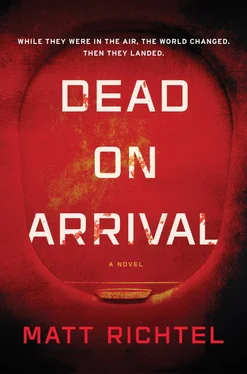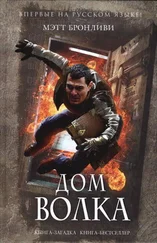Matt Richtel
DEAD ON ARRIVAL
Tarry black horizon. So dark, without contrast, it was as if they weren’t moving at all. Flecks of condensation pecked the wide, arched windshield and disappeared.
Inside the cockpit swirled the pungent odor of nerves. Delta flight #194, the night’s last inbound, and something wrong.
Captain Eleanor Hall stared into the flat Colorado sky and reached overhead to the instrument panel. She twisted the backlit rate knob a quarter turn left.
“Descend to Field Elevation Set. Anything on the radio, Jerry?”
“All I got is static.”
“Not good…” She shook her head and clicked on the engine anti-ice. Then double-checked to see that the fasten seatbelt sign was on. She glanced at the gauges. Just four miles out now, traveling 278 knots with 19 knots on the tail.
“The protocol’s pretty clear.”
First Officer Jerry Weathers put his mouth to the radio. “Hayden clearance, Delta one-nine-four ready to copy IFR.”
In response, he got only static.
“Hayden, copy. This is Delta one-nine-four…”
Static.
“Okay,” Pilot Hall said, looking for a steady voice.
“No, not okay. It’s been ten minutes, Eleanor,” Jerry said. Not a peep from anyone—local or distant—in ten thousand feet. “Definitely not okay.”
Eleanor tensed. Jerry bordered on the officious even when things weren’t going to shit. She went down her checklist. The protocol said you landed anyway. Communications systems could be finicky and, at a small airport like this, the regional control tower might actually be located a long way off, in Salt Lake City, maybe Denver, even Cheyenne. Still, it qualified as odd, in the least, the whole world having gone suddenly silent.
“Hayden, copy,” Jerry said.
Static.
“We’re in control of this, Jerry.” She rubbed the slick perspiration of her palm on her blue pants.
At least the plane seemed to be responding, and landing instrumentation had come a long way. If a pilot could land on an aircraft carrier in World War II, two seasoned pilots and a whole lot of technology could surely touch down softly on an actual landing strip, even in the dark.
“Twenty-five hundred feet. You set the Nav?”
“Yep, for the third time. I got a good ident on the localizer. Must be a glitch at the comm tower. Doesn’t explain why traffic is down everywhere.”
“Stay with me, Jerry.”
Eleanor listened to the wheels unfold—a sound that reminded her of a baby’s hum.
“Landing gear down.” Ordinarily, composure was her forte. It’s why the airline used her for those corporate pep talks to new pilots, who could barely hide their displeasure at suffering a welcoming address. They were often military guys, not the kind of folks who relished a rah-rah speech unless it was before a bombing raid. They might’ve gotten a kick out of this: landing without communications, at night, at a tiny airport in the Colorado mountains outside Steamboat Springs.
Two miles, 214 knots, still the tailwind.
“What goes up must come down,” she said.
“That’s odd.”
“Sorry, I just meant: We went up in the air. We gotta come down. This is good a time as any.”
“No…”
“What? Fifteen hundred feet.”
“Flaps 15,” he announced. “Never mind—the other thing.”
“Jerry?” She allowed herself to turn to her first officer and copilot. He was more than a head taller than her, thin and bordering on gangly. Long arms and legs. His elbows always seemed to be in the way. He hunched his neck in the way of someone uncomfortable with his height when he was in middle school and so took to shrinking in. Still, to those who didn’t know him, he struck a pilot’s confident pose. Eleanor knew him. This kind of pressure could get to him. It’s why she had been pressing him on the communications.
“It’s just… it’s okay. When I pressed the foot brake, it was a little givey,” he said.
“At one thousand. And now?”
“Less. I got this.”
Less than a mile out, 150 knots.
“Final flaps?”
“At thirty. It’s just… the instrument panel, did you see it—a second ago?”
“Jerry, I can see the ground, okay? We need to focus. The panel looks okay.”
“It blinked.”
“It looks fine to me. We’re at five hundred.”
“It blinked on and off. It…” He shook his head and didn’t finish the thought.
She clicked on her headset and spoke. “Hayden traffic, this is Delta 194. We’re in final, downwind from two.”
More static.
The plane decelerated with that vacuum roar, touched down with three bumps, and raced into a taxi, the midsize jet speeding down the strip. Eleanor exhaled loudly, with enormous relief. Ahead and through the flight deck window on both sides, she could make out the tiny airport lit only by the hazy light from the nose.
“I think a drink is in order,” Jerry said. “Or five.”
Eleanor felt an urge to discourage him but decided to let Jerry have his fantasy that they might, at last, share cocktails at some hotel port of call.
“They put us at a lodge over by the mountain,” he said.
She held her tongue. But it wasn’t only because she didn’t want to be presumptuous about Jerry’s overture. It was the eerie nature of the airport. Unusually quiet, even for this time of night. In her left hand, she held the intercom to communicate to the passengers, and on her lips she held the words: Welcome to Steamboat .
But she couldn’t get them out.
She pressed the button to talk and what came out was: “This is the captain. Please keep your seats for a moment; we’re still… we’re getting some unusual weather.”
She depressed the button and stared out the window.
“What weather? Eleanor, what are you talking abou—”
He stopped fiddling with landing protocol. He looked over at her. “What are you…”
“Look.”
She was mesmerized by the image in front of the plane.
“What the…”
“Oh my God.”
“Dr. Martin?”
The voice came from the distance, echoed, died out. Lyle looked down at a square oak dinner table carved with names and initials he couldn’t make out. Deep grooves etched inexpertly with a jagged blade. In the middle of the table stood an overstuffed burlap sack. It overflowed with fine white powder. Next to it, a small, clear plastic medicine cup.
Lyle picked up the cup with an unsteady hand, studied it, squinted to make out the dose at three tablespoons. Jammed it into the chalky substance in the sack. He lifted it to his lips, tried to drink, then swallow. Coughed, dust flew. It settled.
“Dr. Martin.” Closer now. “Please. It’s… it’s vital.”
The powder stirred, churned. Then became a flurry, a miniature tornado, a violent dust storm, swirling and pregnant over the bag. Lyle withdrew, shielded his eyes. The bag bulged, a shape emerged. Black and angular. Wings. Then snarling nostrils, spewed spittle, venom. A bat. Bright red eyes. It flapped furiously. Lifted, became airborne but only momentarily. The bat stalled, fluttered, straining upward as it got sucked back down and submerged into the ashy grave.
A nudge to Lyle’s shoulder. “I… wait…” The plastic cup spilled from his hand.
He sucked in air, gulped, desperate to swallow. He shook his head. Another shoulder nudge, this one hitting its mark. Lyle willed his eyes open. He made out strands of red hair. I’m dreaming, he thought, managing, finally, a swallow. It, the dream, everything, has turned drug sour; too much diphenhydramine chasing too much insomnia.
Читать дальше













